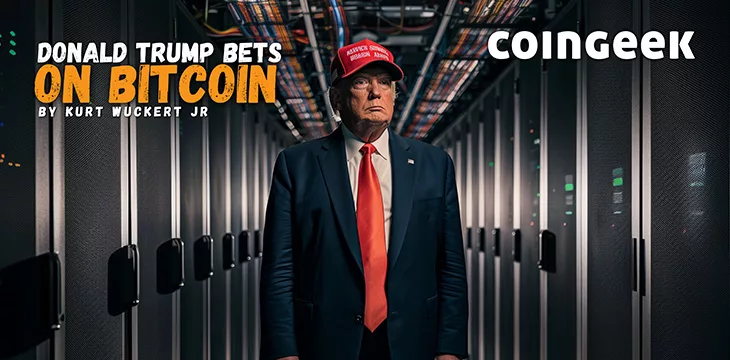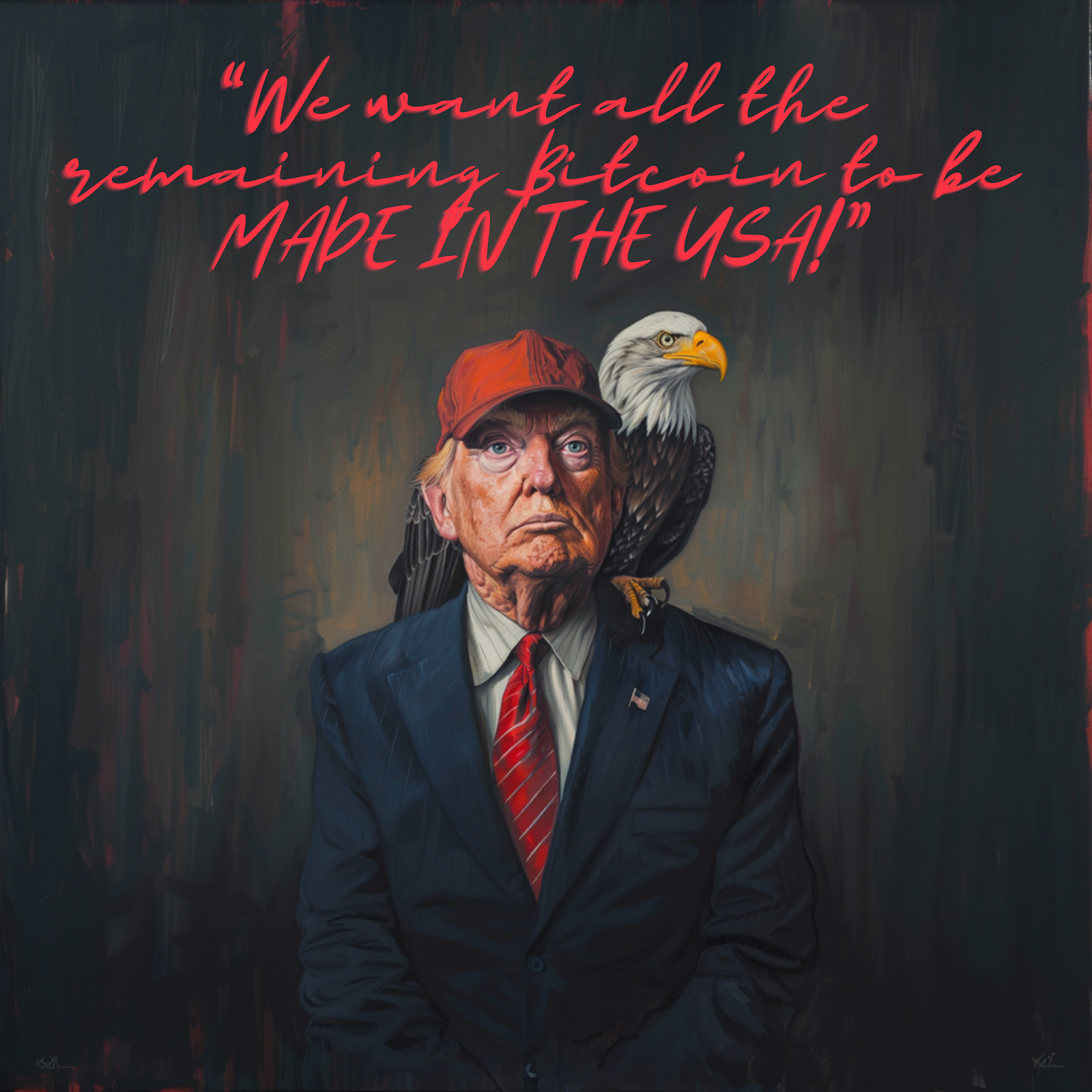
|
Getting your Trinity Audio player ready... |
Former President Donald Trump’s recent meeting with a delegation of BTC miners has sent ripples through the blockchain industry and political landscape alike. In an unexpected but shrewdly calculated move, Trump has positioned himself as an advocate for the Bitcoin mining sector, touting its potential economic benefits and job creation capabilities. However, a closer examination reveals a host of underlying issues that cast a shadow over his position and what it means for the industry.
The meeting’s proposals and implications
Trump’s proposals center around providing federal incentives for Bitcoin mining operations. These incentives include tax breaks, subsidies for energy use, and potential deregulation efforts aimed at easing the operational constraints faced by miners. Trump also highlighted the potential for job creation, particularly in economically distressed areas, positioning Bitcoin mining as a modern industrial revolution.
However, these proposals have drawn mixed reactions. While some industry players see this as a long-overdue recognition of Bitcoin’s economic potential, others view it with skepticism, concerned about the true motivations behind Trump’s overture. The enthusiasm among certain segments of the mining community cannot mask the broader, more complex issues plaguing the industry.
Not shockingly, Biden has, within the last two months, pivoted from proposing a 30% punitive tax on mining in the United States and now stating in public that he and his people will be attending various blockchain round-table type events in Washington D.C. to get up to speed—or, more directly, to save face in an election year.
Hash rate and difficulty: A double-edged sword
One of the most significant challenges facing BTC miners today is the dramatic rise in the network’s hash rate and mining difficulty. As noted in my recent article “It’s the Subsidy,” this increase in hash rate has far outpaced profitability, creating a precarious situation for miners. The hash rate, which measures the total computational power used to secure the BTC network, has reached unprecedented levels, driven by the influx of new mining operations and more powerful mining equipment.
However, this surge has also led to a corresponding rise in mining difficulty, the metric that determines how hard it is to find a new block and earn the associated rewards. For many miners, especially those operating on thinner margins, this means that their operational costs are ballooning faster than their potential profits. The incentives in the industry, such as power curtailment agreements and publicly traded companies using stock to bolster operations, exacerbate this issue. These skewed incentives often prioritize short-term gains over long-term sustainability, leaving smaller, independent miners at a significant disadvantage.
#Bitcoin undergoing a rare miner capitulation. This one is from the halvening event, culling weak miners. As they die, they dump BTC, price rebounds afterwards.
But first we need to purge the degen open interest in futures bets. Liquidations need to happen before a pump. pic.twitter.com/xsSdg5QMsP
— Willy Woo (@woonomic) June 10, 2024
Because of this, the industry needs the price of BTC to stay high, or we will indeed see one heck of a capitulation!
Perverse incentives and industry risks
The BTC mining industry’s challenges are further compounded by perverse incentives that distort market dynamics. Power curtailment agreements, for instance, allow mining companies to purchase electricity at discounted rates, provided they agree to shut down during peak demand periods. While this may seem like a mutually beneficial arrangement, it often leads to a misallocation of resources, where energy is diverted from more essential uses to support mining operations.
Moreover, the involvement of publicly traded companies in BTC mining introduces additional complexities. These companies often use their stock as a financial cushion to weather market volatility, creating a feedback loop that can inflate their market value artificially. This practice not only undermines market integrity but also places undue pressure on smaller miners who lack similar resources.
Additionally, the industry’s reliance on carbon credits and potential money laundering activities in gray and black market jurisdictions poses significant risks. While carbon credits are intended to mitigate environmental impact, they can also create opportunities for exploitation and fraud. In jurisdictions with lax regulatory oversight, BTC mining can become a conduit for illicit activities, further tarnishing the industry’s reputation.
Industry-wide risks and criticisms
The risks associated with BTC mining are not limited to financial and environmental concerns. There is also a growing awareness of the geopolitical implications of mining operations. The concentration of mining power in certain regions, coupled with the industry’s energy consumption, has raised alarms about national security and energy independence.
Furthermore, the industry’s tendency to remain generally apolitical is being challenged by Trump’s overtures. Trump’s appeal to Bitcoin miners serves as a wake-up call for the community to stay vigilant against becoming co-opted by a political party or any branch of the government. The last thing the industry needs is to be caught in the crossfire of partisan politics, which could lead to regulatory crackdowns and increased scrutiny. This is especially risky in the case of Trump, who is the most divisive political figure of our generation.
🇺🇸 “The future of crypto and #Bitcoin will be made in America.” – Donald J. Trump
pic.twitter.com/6ojO9Y1NF0— The Bitcoin Conference (@TheBitcoinConf) June 15, 2024
But it already is what it is, and we are starting to see lines drawn in the sand rapidly.
A stern reminder of political pandering
In closing, it’s essential to recognize that Trump’s engagement with the Bitcoin mining industry is likely more about political posturing than genuine support for Bitcoin. Trump’s history of pandering to various interest groups for political gain should serve as a cautionary tale for the mining community. The allure of federal incentives and deregulation might seem enticing, but it’s crucial to remain wary of the underlying motives and potential long-term consequences, which include continued perverse incentives to thrive amid the waning days of the Bitcoin Civil War, where nobody is sure of bitcoin’s value or where it comes from, but everyone knows the price!

The Bitcoin mining industry was already at a crossroads, facing significant challenges that require thoughtful and strategic responses. While political support and subsidies can provide temporary relief, they are not a substitute for addressing the fundamental issues of profitability, sustainability and integrity, which demand solving Bitcoin’s scalability issues and educating people about them en masse.
As the industry navigates these turbulent times, it must remain steadfast in its commitment to transparency, innovation, and ethical practices, and I’m not bullish on any of that happening here. The single bright spot in all of this is that the discussion will bring more eyes to the challenge, and maybe, just maybe, we can have more frank discussions about all the ways bitcoin could truly disrupt the global economy.
Watch: Calvin Ayre is all in on Metanet—the game-changing fusion of enterprise blockchain, AI & IPv6

 11-21-2024
11-21-2024


